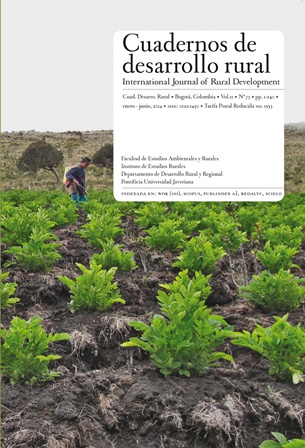Abstract
Este artículo tiene como objetivo examinar por qué se ha incrementado la demanda de trabajadores huéspedes en el sector agrario estadounidense, en un contexto de crisis económica y elevadas tasas de desempleo. Se utilizó una metodología cualitativa que incluyó la realización, entre 2008 y 2012, de entrevistas en profundidad a 60 contrabandistas de migrantes mexicanos, empleados por empresarios agrarios estadounidenses que demandaban trabajadores huéspedes y mano de obra indocumentada. El resultado más relevante de esta investigación es que la demanda de trabajadores huéspedes aparece subordinada a la disponibilidad de indocumentados. Muchos empleadores contratan trabajadores huéspedes, bien porque no disponen de suficientes jornaleros indocumentados, o bien para justificar el empleo de mano de obra ilegal.Cuadernos de Desarrollo Ruralis registered under a Creative Commons Attribution 4.0 International Public License. Thus, this work may be reproduced, distributed, and publicly shared in digital format, as long as the names of the authors and Pontificia Universidad Javeriana are acknowledged. Others are allowed to quote, adapt, transform, auto-archive, republish, and create based on this material, for any purpose (even commercial ones), provided the authorship is duly acknowledged, a link to the original work is provided, and it is specified if changes have been made. Pontificia Universidad Javeriana does not hold the rights of published works and the authors are solely responsible for the contents of their works; they keep the moral, intellectual, privacy, and publicity rights.
Approving the intervention of the work (review, copy-editing, translation, layout) and the following outreach, are granted through an use license and not through an assignment of rights. This means the journal and Pontificia Universidad Javeriana cannot be held responsible for any ethical malpractice by the authors. As a consequence of the protection granted by the use license, the journal is not required to publish recantations or modify information already published, unless the errata stems from the editorial management process. Publishing contents in this journal does not generate royalties for contributors.


